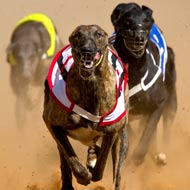
Defra acknowledges more should have been done
The Government has responded to the publication of an Efra Committee report on greyhound welfare, acknowledging that more should have been done by the greyhound industry.
Published in February, the report suggests that bookmakers should commit more to protect racing dogs and should not prioritise profit over high welfare standards.
Now a review of the report by Defra concludes that the industry 'could and should have done more' to demonstrate its commitment to being an open and transparent self-regulator of the sport.
Welcoming the review, Dogs Trust - who have long campaigned for the protection of racing greyhounds - says they are pleased that the Government recognises that more needs to be done.
The charity now calls on the Government to act upon their conclusion and to amend the 2010 Regulations to better protect the welfare of racing greyhounds.
“Like the Efra Committee, we welcome the review of the Welfare of Racing Greyhounds Regulations 2010 currently being undertaken by Defra,” said Dogs Trust veterinary director, Paula Boyden.
“However, we also support the EFRA Committee’s call for clarification from the Government on when this review will be completed and any actions taken forward. We are concerned that the Government will simply rely on industry commitment rather than making legislative changes to tackle the issue.”
The report recommends that the 2010 Regulations are amended to require the publication of essential welfare data relating to injury, euthanasia and rehoming.
It also advises Defra to apply greater pressure to bookmakers to contribute financially to improving welfare standards. Currently some, but not all bookmakers pay a voluntary levy for greyhound welfare, yet the Efra inquiry states that bookmakers made a net profit of £237 million from greyhound racing in 2014.
'We support Efra’s call for a commitment from the Government on what further action will be taken if sufficient welfare contributions aren’t voluntarily made by the industry,' writes Defra.



 The Veterinary Medicines Directorate (VMD) is inviting applications from veterinary students to attend a one-week extramural studies (EMS) placement in July 2026.
The Veterinary Medicines Directorate (VMD) is inviting applications from veterinary students to attend a one-week extramural studies (EMS) placement in July 2026.